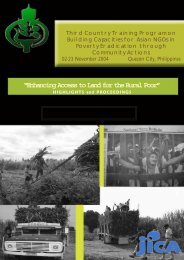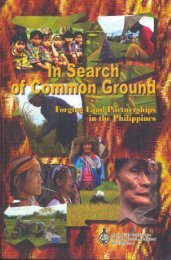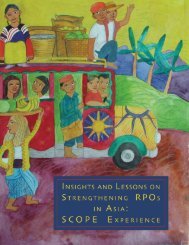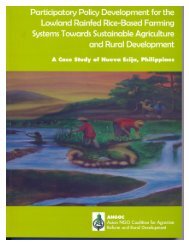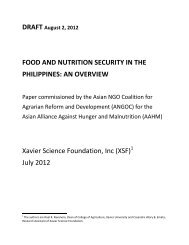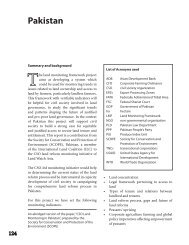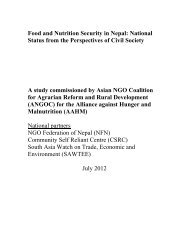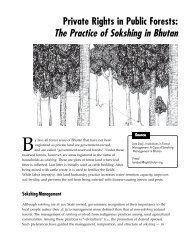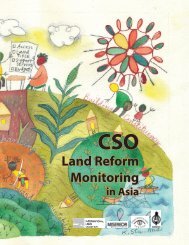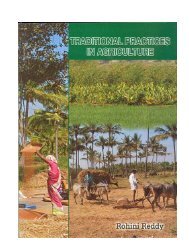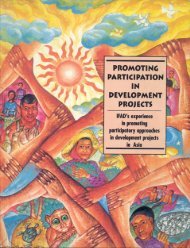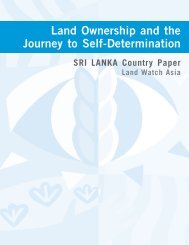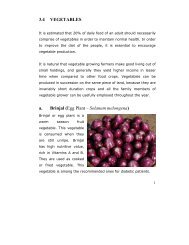Securing the Right to Land FULL - ANGOC
Securing the Right to Land FULL - ANGOC
Securing the Right to Land FULL - ANGOC
You also want an ePaper? Increase the reach of your titles
YUMPU automatically turns print PDFs into web optimized ePapers that Google loves.
Message<br />
We consider <strong>the</strong> question of access <strong>to</strong> resources, and particularly<br />
access <strong>to</strong> land, as one of <strong>the</strong> key questions of<br />
our time. Access <strong>to</strong> land is an issue of food security: <strong>the</strong> majority<br />
of <strong>the</strong> hungry live in rural areas; and in Asia it is above all<br />
<strong>the</strong> landless that are affected by hunger. Moreover, access <strong>to</strong><br />
land is a human rights issue: all signa<strong>to</strong>ry states of <strong>the</strong> Covenant<br />
on Economic, Social and Cultural <strong>Right</strong>s have agreed <strong>to</strong><br />
guarantee access <strong>to</strong> food production resources or <strong>to</strong> <strong>the</strong> labor<br />
market, highlighting <strong>the</strong> importance of access <strong>to</strong> land for a life<br />
in dignity.<br />
However, for <strong>the</strong> majority of <strong>the</strong> poor access <strong>to</strong> land is not freely<br />
available, and <strong>the</strong> distribution seems <strong>to</strong> be at <strong>the</strong> mercy of<br />
power interests. The aspects of <strong>the</strong> land problem vary according<br />
<strong>to</strong> <strong>the</strong> diverse socio-cultural, political and religious situations in<br />
Asian countries.<br />
Never<strong>the</strong>less, <strong>the</strong> aspect of unequal land distribution needs a<br />
closer analysis. The concentration of land tenure may mainly be<br />
a result of former (and current) feudal or colonial property and<br />
ownership relations. However, globalization processes in <strong>the</strong><br />
agricultural sec<strong>to</strong>r and <strong>the</strong> expansion of production for <strong>the</strong> export<br />
market have also led <strong>to</strong> <strong>the</strong> displacement or expulsion of<br />
smaller farmers and <strong>to</strong> an increased concentration of land tenure.<br />
In <strong>the</strong> light of <strong>the</strong> current debate on food prices and on<br />
agrofuel production, this process is even gaining pace. Instead<br />
of halving <strong>the</strong> world’s hungry people by 2015, we observe on a<br />
daily basis <strong>the</strong> negative impacts of <strong>the</strong> globalized economy on<br />
<strong>the</strong> poor.<br />
High food prices lead <strong>to</strong> an increase of poverty and hunger in<br />
<strong>the</strong> world and at <strong>the</strong> same time increase <strong>the</strong> powerful’s interest<br />
in agriculture.Speculating on increasing prices of food commodities<br />
directly causes hunger. The investment of powerful<br />
corporations in agriculture directly reduces <strong>the</strong> access <strong>to</strong> land<br />
of <strong>the</strong> poor and is a main challenge for agricultural reforms.<br />
ix<br />
More and more land is earmarked for animal feed and agrofuel<br />
production, <strong>to</strong> feed and fuel <strong>the</strong> meat and mobility hunger of<br />
wealthy people in industrialized countries—and even in India<br />
and China. As a consequence, <strong>the</strong> pressure on small scale farmers<br />
increases. The land legislation and political framework in<br />
Asian countries do not protect small farmers’ access rights <strong>to</strong><br />
land. The situation of indigenous peoples, whose land rights are<br />
rarely recognized, is even worse.<br />
Many poor lose <strong>the</strong>ir livelihood base even at this moment when<br />
<strong>the</strong> international community intensely discusses <strong>the</strong> hunger<br />
crises and <strong>the</strong> need for sustainable development options in agriculture.<br />
A timely report of <strong>the</strong> International Assessment of Agricultural<br />
Knowledge, Science and Technology for Development<br />
(IAASTD) emphasizes <strong>the</strong> need for small scale, sustainable agriculture.<br />
Compared <strong>to</strong> <strong>the</strong> industrialized agriculture model, small<br />
farms can be superior in terms of economical, ecological and<br />
social indica<strong>to</strong>rs, such as productivity, adaptability and diversity.<br />
They not only increase <strong>the</strong> subsistence level of <strong>the</strong> farming<br />
families, but also serve local markets at reasonable prices and<br />
with good quality. A locally adapted agriculture reduces <strong>the</strong><br />
risks for farming households—an aspect more and more important<br />
in <strong>the</strong> light of climate change and an increased incidence<br />
of disasters.<br />
For MISEREOR, <strong>the</strong>refore, <strong>the</strong> question of access <strong>to</strong> land is even<br />
more important, since we believe that it is a key fac<strong>to</strong>r for a<br />
long term solution <strong>to</strong> <strong>the</strong> world food crisis. More than ever, civil<br />
society has <strong>to</strong> fight for people’s access <strong>to</strong> land—<strong>the</strong> implementation<br />
of land reforms, <strong>the</strong> recognition of user rights on common<br />
land resources, <strong>the</strong> security of land rights irrespective of<br />
gender, caste, religion, etc.. Through participa<strong>to</strong>ry documentation<br />
processes and <strong>the</strong> facilitation of dialogues among government<br />
and civil society in different countries, <strong>ANGOC</strong> and <strong>Land</strong><br />
Watch Asia continue <strong>to</strong> support landless people in <strong>the</strong>ir struggle<br />
for access <strong>to</strong> land.<br />
ANJA MERTINEIT<br />
PROGRAMME OFFICER FOR RURAL DEVELOPMENT<br />
ASIA DEPARTMENT<br />
MISEREOR



